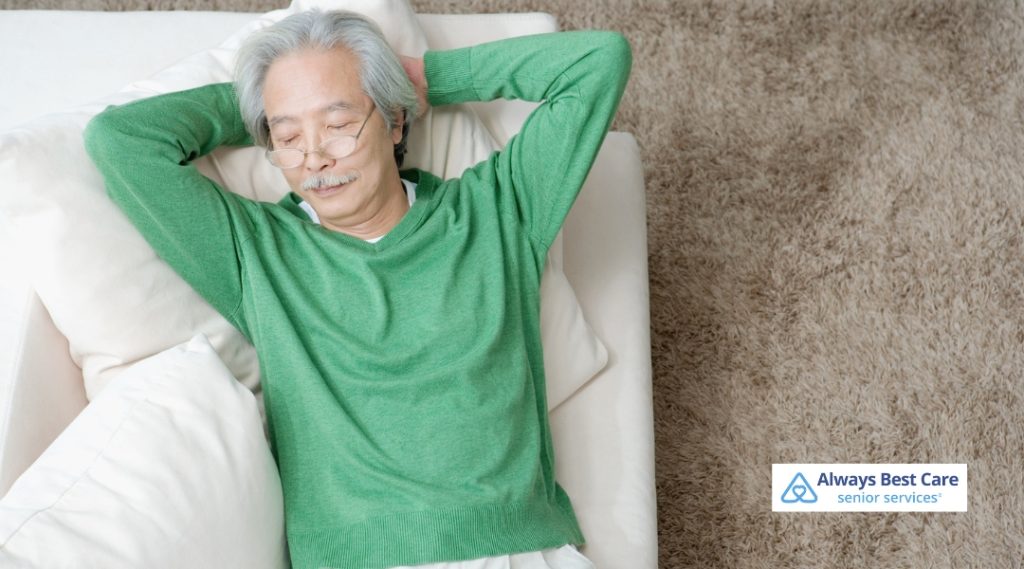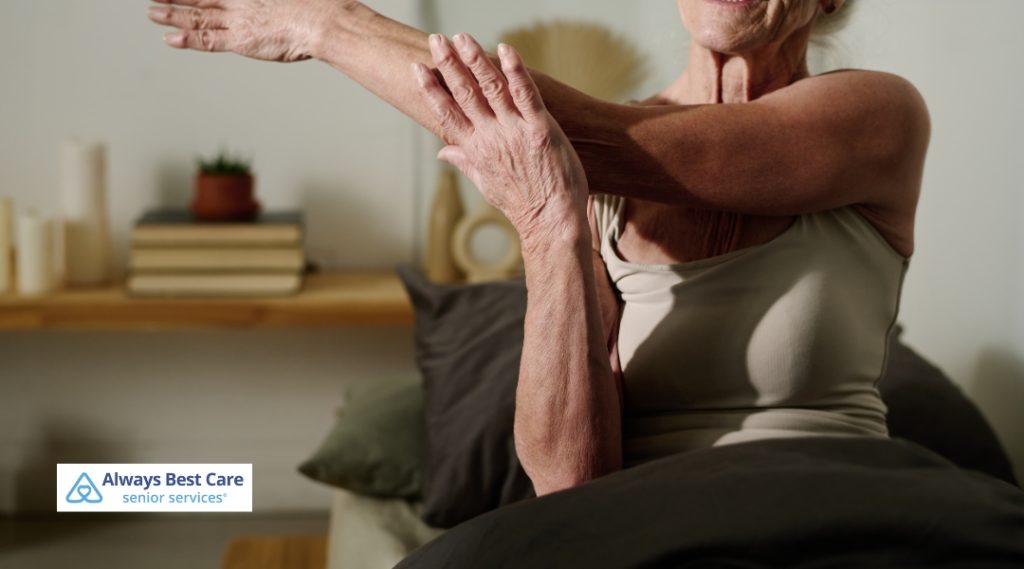6 Ways Seniors Can Beat Insomnia and Sleep Better in Argyle, TX

It’s a peaceful, quiet evening in Argyle, TX, but for many seniors, that peace can be hard to find when sleep won’t come easily.
Insomnia is a common struggle for seniors, and it’s often more than just a restless night here or there. Whatever the reason, poor sleep can take a toll on both body and mind.
If you or a loved one in Argyle has been tossing and turning more than resting, don’t worry—there are simple, effective steps that can make a real difference, so you can reclaim restful nights and wake up feeling more refreshed.
Table of Contents
Why Does Sleep Change With Age?
As we grow older, our sleep patterns naturally shift. Seniors often experience lighter sleep, shorter sleep cycles, and more frequent awakenings throughout the night. This is partly due to changes in the body’s internal clock, which becomes less responsive to environmental cues like light and darkness. Hormonal changes also play a role, with melatonin (the hormone that helps us fall asleep) decreasing with age.

5 Common Causes of Insomnia in Seniors
Insomnia isn’t just a matter of age—a combination of physical, emotional, and lifestyle factors often triggers it. Among the most common causes for seniors are:
- Chronic health conditions such as arthritis, heart disease, or Parkinson’s may cause discomfort or pain at night.
- Medications that disrupt sleep as a side effect, including those for blood pressure, depression, or asthma.
- Mental health concerns like anxiety, grief, or depression can make it hard to fall or stay asleep.
- Poor sleep habits, including irregular bedtimes or excessive screen time before bed.
- Lack of physical activity, which can lead to restlessness at night.
The Impact of Sleep Loss on Senior Health
When sleep is disrupted over time, the consequences can go far beyond fatigue. Chronic sleep deprivation in seniors has been linked to:
- Weakened immune function, making it harder to fight off illness.
- Increased risk of falls due to impaired balance and slower reflexes.
- Mood disorders such as irritability, depression, or anxiety.
- Memory and concentration issues, which can affect daily functioning and independence.
- Worsening of chronic conditions, including high blood pressure and diabetes.

1. Stick to a Consistent Sleep Routine
Our bodies thrive on routine, especially as we age. Going to bed and waking up at the same time every day helps regulate the body’s internal clock, making it easier to fall asleep and stay asleep.
Inconsistent sleep schedules can confuse your circadian rhythm, leading to fragmented rest and groggy mornings. By setting a regular bedtime and sticking to it—even on weekends—your body learns when it’s time to wind down, which naturally promotes deeper, more restorative sleep.
Establishing calming rituals before bed can signal to your brain that it’s time to rest. This might include reading a book, listening to soft music, doing a short meditation, or practicing gentle stretches. A warm bath or some light aromatherapy can also ease the transition into sleep.
2. Create a Sleep-Friendly Bedroom
A slightly cooler room—around 65°F—is ideal for sleep, as it helps lower your body temperature, which signals that it’s time to rest. Quiet surroundings are just as important. Noise disruptions, even subtle ones, can keep you from reaching the deeper stages of sleep. Comfortable bedding and a supportive mattress also go a long way in preventing aches and restlessness.
Sometimes, the right tools can transform your sleep environment. Blackout curtains block out early morning light or street lamps that might interfere with sleep. A fan can keep the room cool while also offering gentle white noise. Speaking of which, white noise machines or apps can help drown out disruptive sounds like traffic or barking dogs, creating a more peaceful atmosphere.

3. Make Smart Dietary Choices Before Bed
What you eat—and when you eat it—can have a big impact on how easily you fall asleep. Certain foods and beverages can disrupt your rest, while others can gently support your body’s natural wind-down process.
Caffeine is the most obvious culprit; tea, chocolate, and even some pain relievers contain caffeine that can linger in your system. Alcohol may initially make you drowsy, but it tends to disrupt the deeper stages of sleep. Heavy or spicy meals can also cause discomfort or indigestion, making it harder to settle into restful sleep.
Opt for a light, sleep-friendly snack if you’re feeling a bit hungry before bed. A banana, a handful of almonds, or a slice of whole-grain toast with peanut butter can help keep your blood sugar stable through the night.
4. Stay Active—But at the Right Time
Exercise helps regulate your circadian rhythm and promotes the production of sleep-supporting hormones like melatonin. It also helps release physical tension, reduce anxiety, and improve overall health—all of which can lead to more peaceful sleep. The key is timing: intense workouts close to bedtime can actually make it harder to fall asleep, so aim for activity earlier in the day.
In Argyle, TX, seniors can access a range of gentle yet effective exercise options. A brisk morning walk around a quiet neighborhood, light gardening in the yard, or a water aerobics class at a local community center can all provide the movement your body needs. Even simple stretches, tai chi, or chair yoga done consistently can make a big difference without putting strain on joints.

5. Reduce Stress to Sleep More Peacefully
For many seniors, nighttime can bring a wave of anxious thoughts that make it hard to fall or stay asleep. Learning to quiet the mind before bed can help turn restless nights into restful ones.
Mindfulness practices like meditation are especially powerful for calming the mind and easing the body into a state of rest. Even a few minutes of slow, intentional breathing or guided meditation can lower heart rate and reduce tension.
6. Review Medications That May Disrupt Sleep
Sometimes the answer to poor sleep is hidden in the medicine cabinet. Many seniors take multiple prescriptions, and even medications meant to help with one condition can unintentionally interfere with sleep.
Some medications, including those for blood pressure, asthma, depression, or even over-the-counter cold remedies, can cause sleeplessness, vivid dreams, or nighttime awakenings.
Your doctor can help identify whether any current prescriptions might be contributing to your insomnia, and they can offer guidance on how to manage or adjust your medication schedule without compromising your overall health.
Depending on your health needs, safer, more sleep-friendly alternatives may be available. Sometimes, changing the dosage, switching to a different medication, or taking certain pills earlier in the day can make a noticeable difference.
For those looking to support sleep more naturally, your provider might suggest melatonin supplements, herbal teas like chamomile, or lifestyle changes that complement your health goals.

How In-Home Care Promotes Better Sleep
When seniors struggle with sleep, it’s not always about what they’re doing wrong—it’s often about what support they’re missing. That’s where in-home care can make a real difference. Our well-trained caregivers don’t just provide assistance; they offer peace of mind, stability, and comfort that naturally supports more restful nights.
A consistent evening routine can be hard to maintain alone, especially for seniors facing mobility issues, memory loss, or health challenges. In-home caregivers can help with everything from preparing a light snack to setting the room up for sleep, closing the blinds, turning off screens, dimming the lights, and making sure medications are taken on time.
Even more important, they provide calming companionship. Knowing someone is there can ease nighttime anxiety, reduce feelings of isolation, and create a more secure environment—all of which are key ingredients for good sleep.
In Argyle, TX, families value trust, comfort, and care that feels personal. In-home caregivers from Always Best Care understand this deeply. They take the time to learn each client’s preferences and needs, creating bedtime routines that feel natural and comforting, not clinical or rushed.
Rest Better Tonight—Connect With Always Best Care of Argyle!
At Always Best Care of Argyle, we understand the challenges that come with aging, including sleep difficulties. Our compassionate caregivers can help establish a calming nighttime routine, assist with daily activities, and provide companionship to reduce stress and promote relaxation.
If you or a loved one is struggling with insomnia and needs extra support, we are here to help. Contact Always Best Care of Argyle at (940) 241-2273 to schedule a care consultation and learn how our in-home care services can improve your quality of life. A restful night’s sleep is just a call away.





